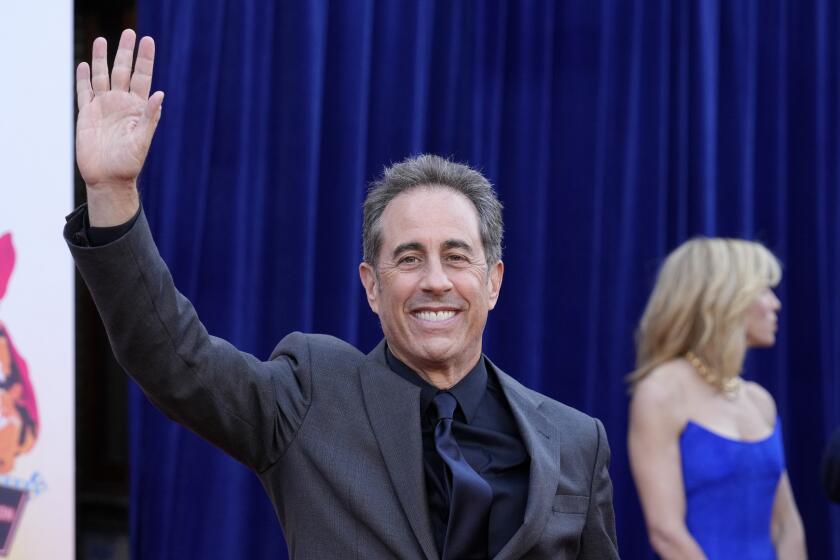Writers Guild policies ensure it’s a union divided against itself
I was surprised to read Stephen Schiff accusing me of being divisive and trying to “politicize” the Writers Guild of America just because I believe the guild has an obligation to try to protect the first writer on a screenplay (“Writing Credit Changes Proposed,” by Lorenza Munoz, Oct. 4). He said it was “dangerous” for me to try to divide the union into first writers and rewriters.
But the union already is divided, and Schiff, who is co-chairman of the credits review committee, is well aware of it. Freelance screenwriters are increasingly being paid less and less to do more and more work setting up films for the major studios. It can take a screenwriter dozens of pitches, treatments or specs and years of work to finally get a movie started. Writers are often asked to do many unpaid rewrites and can spend months waiting for notes between them. I’m not talking about wannabe screenwriters; I’m talking about working guild writers, who are truly suffering under this system, having trouble paying their bills and feeding their families even as they help get a big studio film off the ground. That is the reality of our business.
On the other end of the spectrum, a big-name rewriter can be paid huge amounts of money for a few weeks of work once the film is green-lighted by the studio. And the current guild rules encourage the rewriter to throw out as much of the previous writer’s work as possible. A rewriter who throws out enough material, and makes enough changes, can remove all the other writers’ names from the film. And if this was not enough incentive to destroy other writers’ labor, huge bonuses, up to $1 million or more, are tied to getting credit. This is also the reality of our business.
It is a reality that enormously favors the last rewriter, especially powerful ones who also are directors or producers. And it is, simply, morally wrong.
From a business and creative standpoint, it is hurting our industry. It is why big-budget films are more likely to be poorly written and full of plot holes than low-budget ones. It is why feature development drags on longer and longer, year after year. It is why studios have to pay less to first writers, so they can have the money to pay rewriters. It is why our most talented writers quickly become directors, because the Directors Guild, unlike the Writers Guild, protects its membership.
Imagine, in television, if David E. Kelley were brought in to rewrite Aaron Sorkin’s idea for a new show and then David Chase were brought in to rewrite that. In television, powerful and talented writers almost always refuse such work. They want to create their own shows, not rewrite other powerful writers, or other weak writers. In fact, powerful TV writers often mentor and assist up-and-coming writing talent by co-creating or producing with them. And that’s why some of the best writing around is on shows like “The Sopranos” and “The West Wing.” Because writers help writers.
In feature films, our system is completely upside-down. The studios often hire the cheapest writer they can find, assuming they’ll bring on more expensive writers once they have made up their minds to make a film. This is not the studio’s fault. Hollywood is a business of stars, and it’s not unreasonable for studio executives to be in awe of talented and successful writers and want to work with them. The problem is that these writers have too much incentive to take these jobs and cannibalize other writers’ work.
Powerful and talented writers should be writing their own scripts. But the Writers Guild’s credits system encourages them not to. The moment any writer achieves any level of success, the temptation to be last in the development food chain is usually too great to resist. You can get all the credit, and a lot more money, for a lot less work. That’s simply the truth.
I’ve spent more than 10 years -- two on the Writers Guild’s board of directors and five on the credits review committee -- trying to bring writers together to confront the way our credit system affects the industry. When I served on the committee, I begged Schiff and anyone else who would listen not to push forward the proposals that are now being put to the membership for a vote, precisely because they are divisive. It was simply foolish to think the membership would support proposals designed to give even more credit to our most powerful members at the expense of our weakest. I resigned in hopes they would reconsider, or that the board would act to stop them.
What political gain does Schiff think I achieve by trying to fight these changes? I hold no political office, nor do I seek one. And I am a writer-director-producer and exactly the kind of writer these proposals would help.
But Schiff is right: I am seeking to politicize this union. Once these changes are defeated, the Writers Guild needs to confront the very real and growing problems we face with our credits system. It needs the political will to do something that will change our system for the better, not the worse. And it needs to start talking about what that might be, right now.
More to Read
The biggest entertainment stories
Get our big stories about Hollywood, film, television, music, arts, culture and more right in your inbox as soon as they publish.
You may occasionally receive promotional content from the Los Angeles Times.






